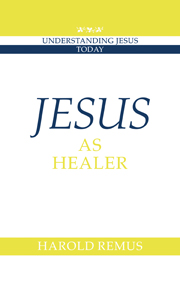Book contents
- Frontmatter
- Contents
- Preface
- 1 Jesus as Healer: Prologue
- 2 Jesus as Healer: The Gospel of Mark
- 3 Jesus as Healer: The Gospel of Matthew
- 4 Jesus as Healer: The Gospel of Luke
- 5 Jesus as Healer: The Gospel of John
- 6 Jesus as Healer: Apocryphal Writings
- 7 “In His Name”: Jesus Heals Through His Followers
- 8 Did Jesus Really Heal?
- Questions for further thought and discussion
- Suggestions for further reading
- Index of Subjects and Names
- Index of Ancient Writings
4 - Jesus as Healer: The Gospel of Luke
Published online by Cambridge University Press: 12 October 2018
- Frontmatter
- Contents
- Preface
- 1 Jesus as Healer: Prologue
- 2 Jesus as Healer: The Gospel of Mark
- 3 Jesus as Healer: The Gospel of Matthew
- 4 Jesus as Healer: The Gospel of Luke
- 5 Jesus as Healer: The Gospel of John
- 6 Jesus as Healer: Apocryphal Writings
- 7 “In His Name”: Jesus Heals Through His Followers
- 8 Did Jesus Really Heal?
- Questions for further thought and discussion
- Suggestions for further reading
- Index of Subjects and Names
- Index of Ancient Writings
Summary
“Luke, the beloved physician.” Thanks to these few words in the Letter to the Colossians (4.14) an early Christian named Luke became in ancient times the patron saint of physicians and surgeons. In our time a society formed some decades ago to foster healing ministry, originally in the Anglican/Episcopal church, took the name the Order of St. Luke, and at various times writers of fiction have taken pen in hand to provide “the beloved physician” fuller treatment than the New Testament writers did. Around these same few words as well as other New Testament references to “Luke” (Philemon 24; 2 Tim. 4:11) clusters a considerable body of scholarly literature debating whether “Luke” was the author of a full quarter of the New Testament - the Gospel of Luke and the Acts of the Apostles - and, if so, whether he was indeed a physician.
No author is named in the Acts. The “we” passages (Acts 16:10-17; 20:5-8, 13-15; 21:1-18; 27:11-28:16) are no exception; they tell us little except that the author, following literary convention, wants readers to know he had experienced the kind of sea travel described in those passages. Nor is any author named in the Gospel of Luke, a trait it shares with the other three New Testament gospels. The superscriptions of all four - “The Gospel According to … ” - are all later additions. Ultimately, the authors of all four remain anonymous, like so many of the early Christians (cf. 2 Cor. 8:18-19). Reading between the lines of the gospels, however, one can learn a fair bit about the evangelists, virtually none of it undisputed, however.
Medical terminology
From the medical terminology in the Gospel of Luke, W. K. Hobart [The Medical Language of St. Luke [1892]) concluded that the author must have been a physician - a view supported by the distinguished historian of ancient Christianity, Adolf von Harnack (Lukas der Arzt, English translation, Luke the Physician [1907]), as well as other scholars. In 1920, however, Henry J. Cadbury of Harvard Divinity School showed that the supposedly technical medical language of the author was the common property of many authors who were definitely not physicians, even as today, thanks to increasingly sophisticated journalism and the health newsletters published by various medical schools, medical terms such as ebola, AIDS, HDL and LDL, amniocentesis, or in vitro come up regularly in ordinary discourse.
- Type
- Chapter
- Information
- Jesus as Healer , pp. 52 - 69Publisher: Cambridge University PressPrint publication year: 1997



